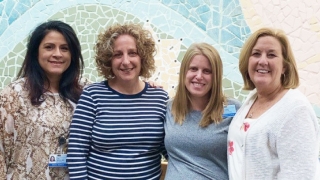A Special Team to Guide Families Through Their Care Journey
Published on
In Utero InsightsPublished on
In Utero Insights Fetal Heart Program Nurse Coordinators and Social Worker, from left: Lucia Figueroa, LSW, MSW; Jill Combs, MSN, RN; Elizabeth Smith, RN, BSN; and Elizabeth Coulter, RN, BSN, MS.
While most parents are usually overcome with joy when experiencing a new pregnancy, families whose children are diagnosed with birth defects before birth go through a much more complex experience. Many experience grief, fear and anxiety and face a long journey ahead.
Fetal Heart Program Nurse Coordinators and Social Worker, from left: Lucia Figueroa, LSW, MSW; Jill Combs, MSN, RN; Elizabeth Smith, RN, BSN; and Elizabeth Coulter, RN, BSN, MS.
While most parents are usually overcome with joy when experiencing a new pregnancy, families whose children are diagnosed with birth defects before birth go through a much more complex experience. Many experience grief, fear and anxiety and face a long journey ahead.
Like the Center for Fetal Diagnosis and Treatment, the Fetal Heart Program (FHP) at Children’s Hospital of Philadelphia (CHOP) provides comprehensive, compassionate care that addresses the medical as well as psychosocial effects of a family’s experience in the setting of a fetal congenital heart disease diagnosis. Patients are skillfully cared for by a multidisciplinary team. Each member of this team has special clinical expertise in fetal and pediatric heart care and brings a unique skill set to the table. The sonographer imaging specialist acquires high quality images, the cardiologist provides clinical expertise in interpretation and decision making, the social worker addresses psychosocial concerns, and the nurse coordinator provides counseling, education and guidance and is the glue that holds it all together.
Nurse coordinators in the FHP are clinicians, educators and care coordination specialists all rolled into one unique role. As clinical nursing experts with a vast understanding of congenital heart disease and the specialized care required, we explain clinical elements of cardiac care and address clinical cardiac questions families may ask. We serve as the fetal heart point person for families, shepherding them through their prenatal cardiac care journey. We are often the kind, supportive voice on the phone when the initial call is made and by their side from their first visit during one of the most vulnerable times in their lives, providing education and resources, coordinating care appointments and specialist consultations, and preparing families for what to expect at each stage of their care journey.
After a comprehensive fetal cardiac imaging evaluation, the core multidisciplinary Fetal Heart Program team — consisting of a pediatric/fetal cardiologist, a nurse coordinator and a social worker — meets with families to explain the diagnosis, outline treatment options and care outcomes, and answer questions. Each defect is unique, and each family dynamic is unique. Our team tailors care to those differences and helps families make the best care decisions for their particular situation.
Our patients routinely return for follow-up once a month for a fetal echocardiogram to image and monitor the fetus’s heart and for repeat counseling with the core team. Meeting with families regularly allows us to reinforce education and provide anticipatory guidance as a means to prepare the family for the arrival of their baby.
During each follow-up visit, the FHP nurse coordinator helps families plan for the next stage in their care journey, whether it be a unique fetal diagnostic or treatment procedure or delivery and postnatal cardiac care. If a baby is expected to stay in CHOP’s Evelyn and Daniel M. Tabas Cardiac Intensive Care Unit (CICU) after birth, the nurse coordinator explains to families what to expect in the CICU by touring the unit. This allows the family to visually appreciate the unit as well as become oriented to the logistics of postnatal cardiac care.
The social worker collaborates closely with the nurse coordinator to help families overcome any challenges and obstacles to care and address the often-added stressors that come with a fetal diagnosis. The social worker assesses families’ psychosocial, financial and logistical situations to determine the necessary services to assist the family through their care journey and connects them to available resources. Depending on a family’s needs, the social worker can connect them to mental health services, chaplaincy and child life therapy as needed. If families desire to relocate to be closer to care, the social worker connects them to contacts in the community who can provide nearby lodging. If families are struggling to make it to the hospital for follow-up visits, the social worker can provide resources to assist with transportation.
Prior to delivery, members of the core FHP team brief colleagues in neonatology, cardiac intensive care and other pediatric subspecialties on the baby’s clinical and psychosocial specifics to ensure a seamless transition to postnatal life.
Our hands-on team approach in the FHP enables us to provide personalized care to each of our families. Families trust us to know their story, attend to every detail and guide them throughout the entire process. This unique, comprehensive team approach distinguishes our program as one of the leaders in the nation and as a model for setting the standard of care for prenatal cardiovascular conditions.
Contributed by: Jill A. Combs, MSN, RN
Categories: Fetal Heart Program